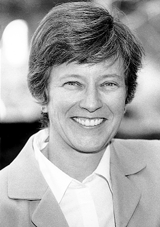Appeals court refuses to stop Massachusetts marriages
Rejecting a last-ditch attempt by opponents to put a stop to same-sex marriages in Massachusetts, a unanimous federal appeals court in Boston ruled on June 29 that the state’s highest court did not violate the federal constitution when it ruled that Massachusetts must let same-sex partners get married.
The panel, consisting of Chief Circuit Judge Michael Boudin and Circuit Judges Sandra Lynch and Jeffrey Howard, affirmed a recent ruling by District Judge Joseph Tauro, rejecting the argument that the Massachusetts marriage decision violates the federal constitutional guarantee that each state shall have a “republican form of government.”
The three appeals judges issued a joint opinion.
The lawsuit had been brought by a group of state legislators, who argued that only the political branches of the government—the legislator and the governor—could decide who is entitled to marry, since that is a political public policy issue. They argued that by dictating a particular result, the state’s highest court had usurped legislative functions in a ruling inconsistent with the notion of a republican government, in which the people’s elected representatives make the law.
But the opponents of same-sex marriage ran up against more than two centuries of a broad, tolerant approach by the U.S. Supreme Court on the question of whether particular variations in the structure and composition of state governments might be said to violate the so-called “Guarantee Clause.”
The plaintiffs had also relied on their reading of the Massachusetts Constitution, which they say the state high court had violated. However, the Massachusetts Supreme Judicial Court had already rejected that argument, and under the federal Constitution the highest court of a state has the last word on the meaning of the state’s constitution. Although District Judge Tauro had voiced some agreement with the Massachusetts high court’s ruling on that score, the court of appeals basically said that it would take a hands-off approach on any question of interpreting the Massachusetts Constitution.
Instead, the court relied on past U.S. Supreme Court decisions that effectively added up to a very undemanding view of what constitutes a republican form of government. In essence, if the structure of state government was established by the people of the state through an appropriate constitutional process, and the people retained the ultimate authority to change laws with which they disagree through a constitutional amendment process, the federal courts are unlikely to step in, except for the unlikely event that the people of a state try to set up a monarchy or a dictatorship rather than a system in which their chief executive and legislators are elected by the public.
The plaintiffs had argued that the time-consuming amendment procedures, under which a proposed state amendment against marriage cannot come before the general public for a vote until the fall of 2006, meant that the court had been free to “legislate” without any immediate danger of being “checked” by the popular will. But representative government does not necessarily mean that the Legislature has to have the first, decisive word on every matter of public policy, otherwise the courts could not function to decide any case that raised questions not directly addressed by an explicit statutory provision. As a practical matter, pure “republicanism” is not required by the federal Constitution.
And, after all, the people of Massachusetts had democratically approved a constitution that established this prolonged amendment process.
Of course, the opponents of same-sex marriage vowed to seek U.S. Supreme Court review, which seems highly unlikely to be granted.
The Gay and Lesbian Advocates & Defenders, represented by Mary Bonauto, intervened in the court case on behalf of the seven same-sex couples on whose behalf the Boston-based public interest law firm first won same-sex marriage rights last November.


































